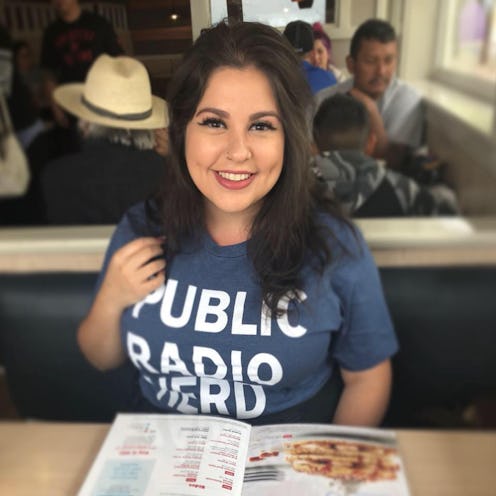Life
I Grew Up Thinking I Was Hispanic. Here’s Why I Chose To Identify As Latinx Instead

I didn’t learn how to speak English until I started elementary school. If you watch my parents’ old VHS tapes, you’ll see little May speaking perfect Spanish. Watching those videos as a teen, I felt like I was seeing a completely different person because by then, I didn’t speak Spanish at all. Now, I speak Spanish, my native language, with an American accent.
I didn’t choose to leave my native language behind; I was partly forced to, and partly dropped it unwittingly. I was made in Mexico, but my parents immigrated to Texas shortly after learning they were pregnant with me; they wanted me to be an American citizen. I was born in a small town on the Texas-Mexico border, nestled in the Rio Grande Valley.
In my Valle hometown, you can get by just fine if you don’t speak English. Nevertheless, in elementary school, they made it a point to assimilate the tiniest citizens. While I was learning how to read and write and forming my earliest meaningful friendships in English, at home my parents were practicing it so they could learn, too. By the time I was 11 years old, I had forgotten how to speak Spanish altogether.
There’s a term for a Latinx or Hispanic person who doesn’t speak Spanish fluently: pochx. In the most formative years of my life, I was a pocha. Some people might still consider me to be a pocha, because of my accent.
“But how is that possible? Didn’t your parents speak Spanish at home?,” people would ask. Yes, they did. And often. But I’d converse with them in English while they’d reply in Spanish.
How could I have just abandoned my rich, colorful culture for one that often demonized me and others like me? Being so separated from my roots made me feel like I wasn’t Mexican in anything more than my name.
Beyond not speaking Spanish, as I grew up, I embraced American culture over my Mexican one. I didn’t know who Jenni Rivera was. I didn’t understand my middle-school classmates’ obsessions with the ultra-popular teen drama Rebelde. I felt like an embarrassment to myself and my parents. And I blamed myself for it, completely. How could I have just abandoned my rich, colorful culture for one that often demonized me and others like me? Being so separated from my roots made me feel like I wasn’t Mexican in anything more than my name.
So in college I decided to buck up and re-culturalize myself from almost-scratch. I listened to music in Spanish, reading along to the lyrics, and would watch movies and TV shows that I already knew with Spanish dubbing. (Mean Girls is just as good in Spanish, by the way.) Another thing that helped was conversing with my parents in our native language, which was difficult because I had to fight the embarrassment of my poor conjugation skills. It wasn’t easy, and it took a long time. At 22 years old, I had become fluent once again — except for that American accent. Either way, I felt whole again — for a while.
As I grew closer to my Hispanic heritage by learning my native language, I'd also began to learn more about Mexico’s history. Like what happened in many Hispanic — meaning, Spanish-speaking — countries, the Spanish invaded, wiping out native populations in their wake. Spanish influence took hold in Mexico, including what's present-day New Mexico, where I'd moved after college. I realized why my surname, Ortega, was so common in New Mexico while it wasn’t at all in the Rio Grande Valley: it’s deeply Spanish. By the time my country fought for and won its independence from its rulers three centuries after the conquest, the Spanish language and culture were deeply woven into it. As they are into me. And that meant I was connected to that bloody, brutal past.
But the term Latinx — a geographical term that encompasses all of Latin America — acknowledges that history without erasing it, and without centering the colonizers. I don't appreciate the historical connotations of "Hispanic" — so I chose "Latina" instead. With my self-acceptance, and growing closer to my culture, came the decision to identify as Latina, not Hispanic.
Knowing all that I do now about my country and what was taken from it, I understand that being Mexican doesn’t come down to the language I speak, how cultured I am or the tone of my skin. My parents are Mexican. I came from Mexico, and I’m an American, too. Y más vale que respetes a esta pinche pocha — and you better respect this fucking pocha.
For more Latinx Heritage Month content on Bustle, click here.